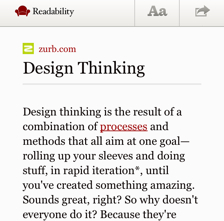The other day, Bryan and I came across this tweet:
Design IS the new black, but then again hasn't it always been? j.mp/GIKWA8 #design @zurb
— Hannes Helander (@hanneshelander) March 23, 2012
When we clicked on the link, we got a page with our ZURBword, Design Thinking, that had been stripped of our brand except for a tiny, tiny logo and a link back to our original page. The page had even been formatted for mobile, even though our original page is already responsive. It had us scratching our heads — what was going on here?
 ZURBword Design Thinking on Readability's mobile view.
ZURBword Design Thinking on Readability's mobile view.Come to find out it had been scraped by Readability, a reader app. It's kinda like Instapaper, scraping ads, pics and other visual elements, leaving only the text so it can be read on a desktop or mobile device. There was even a desktop page with our original page but with an iFrame, kinda like the old DIGGbar that stirred up a hornet's nest.
We had a ton of questions about reader scrapers, which have been called legally iffy in the past, and if it hurts a company's brand. Others did too. We decided to ask around, including reaching out to the folks at Arc90, who released Readability.
"It Can Actually Be A Good Thing ... "
Here's the question we put to Rand Fishkin, CEO and founder of SEOMoz: Is this legal? Can they get into trouble for something like this? Is this taking away from our SEO?
If they're linking back to you, it probably doesn't hurt your SEO. On the legal front, I'd check with a lawyer, but a lot of sites republish stuff via RSS. It can actually be a good thing, unless they're trying to claim the content is their own.

Rand's chimed in on this before, even leaving this comment on a Google + thread:
At Moz, we've seen a ton of times when our content gets scraped that Google actually seems to recognize and count many of the absolute links back (and scrapers/spammers are usually too lazy or using software too simplistic to change/remove those).
Hence, with absolute links, we're getting links to everything we point to in our RSS feed from dozens to hundreds of sites every time we hit publish. Granted, most of those are spam/crap and will eventually be devalued, but it's a temporary boost nonetheless (and it also helps avoid being perceived as a duplicate of something one of those scrapers published and Google saw first).
"Something Much Bigger than Readability"
We also reached out to Rich Ziade, creator of Readability and co-founder of Arc90, with a few questions. Here's what he had to say:

Are you worried about possible copyright issues surrounding publishing content that strips off a lot of a content creators' brand that aren't signed up as a partner with Readability?
I think you're hitting on something much bigger than Readability here. Content consumption is changing dramatically and rapidly. As digital content continues to morph and bend and end up in apps, the ability of copyright to act as compass continues to be challenged. Apps like Zite, Pulse, Reeder, Instapaper, send-to capabilities in Twitter clients all could be framed as raising copyright issues. I think it's an important conversation to have. Speaking for Readability, we're quite sensitive to these issues but at the same time believe there are new opportunities ahead if publishers can better understand and capitalize on these new reading patterns and behaviors.
Doesn't this actually divert traffic from our site and onto yours?
Right now, Readability URL's of articles don't allow robots and have a <link rel='canonical'> in the head tag which points crawlers to the original source. In terms of the reading view ' yes we show a reading view in mobile and a reading bar in desktop. When you open in a desktop browser we show a reading bar up top because we can technically do it. It's practically impossible to implement a reading bar in mobile views (i.e. iframe support sucks in mobile). Also, it's worth noting we're not the first mobilizer out there. Google's mobilizer has been around for years and it does effectively the same thing (albeit in an uglier fashion).
After doing some research, we understand you have a 70% micropayment system for publishers whose content is reformatted — how exactly does this work for publishers, like us, who aren't signed up with Readability?
The way it works is that we keep money based on those that have visited even before you've signed up for up to a year prior to you signing up. Once you sign up, you'll see the visits and the pro rata breakdown there. It's a very experimental system that we put out there. We've learned a lot and we plan to share what we've learned soon in a future blog post on our end.
An Important Conversation To Continue Having
We'd like to thank both Rand and Rich for taking the time to answers our questions. As Rich pointed out to us, there's still a lot more to talk about and it's an important conversation to continue having. It'll be interesting to see how reader apps deal with copyright and intellectual property as more and more people use them.